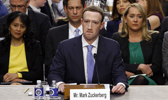
In attempting to live up to the ideals of free speech and free trade, the complexity of achieving each soon becomes apparent. That’s because in practice, neither of these ideals literally exists – even in the Western nations that rightly hold them as high virtues.
Given the best of intentions, it is highly doubtful that Mark Zuckerberg’s recent grilling before a US Senate hearing committee will actually pave the way towards any guarantee of ‘free speech’ on Facebook. His hauntingly welcome acceptance of government regulation on ‘privacy’ issues that would affect how he runs his Facebook business model may well open the barn door to the entrenchment of regulated speech – by government.
Said Zuckerberg: “Our position is not that regulation is bad. I think the Internet is so important in people’s lives and it’s getting more important, the expectations on Internet companies and technology companies overall are growing. And I think the real question is ‘What is the right framework for this?’ not ‘Should there be one?’”
Perhaps that’s a question that should be posed to the Apple Corporation, which has just been forced to comply to the Chinese regime’s new cyber-security law.
As reported by Paul Huang in the Jan 25/18 Epoch Times: Effective Feb 28, users of Apple devices in China would have their “private data hosted by a Chinese state-owned company with intimate links to the People’s Liberation Army – uncomfortable facts the US company has not told the millions of Chinese users of its devices.”
As we can see, China has ‘solved’ its electronic data ‘privacy’ issue exactly as one would expect of a Communist country.
It is in dealing with nations and jurisdictions that do not share Western ideals of free speech or free trade that the contradictory complexities of negotiating increased freedom in either arise. Minor ‘complexities’ can become the very obstacle that prevents the major goal’s ultimate achievement. Apple’s experience in China is but one tiny example of the challenge.
To offer more insight to these complexities, our in-studio guest Salim Mansur provides a short history and context about trade with China that goes a long way towards explaining US president Donald Trump’s economic strategy of threatened and enacted tariffs against China. Is Trump a ‘protectionist’ opposed to the principle of free trade, or is Trump the only one really promoting what could rightly be called free trade?
In the ensuing discussion and debate about the distinctions between ‘free trade’ and ‘fair trade,’ it’s good to know that when motivated by the common principle of individual freedom, more than one perspective on the subject can be Just Right.


Sorry, the comment form is closed at this time.